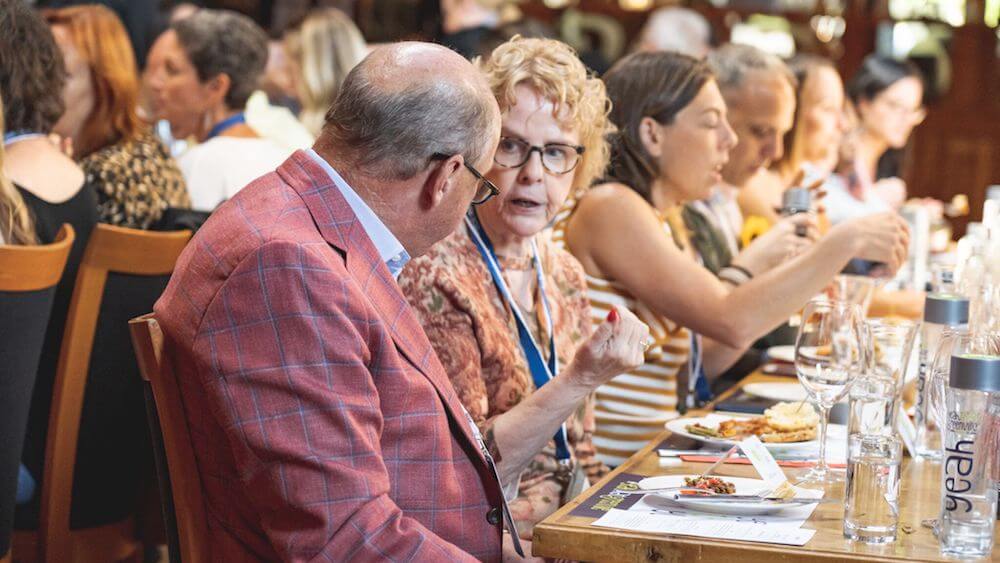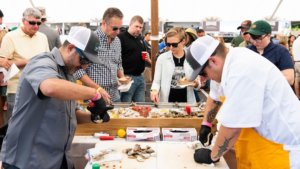
Held in collaboration with euphoria, the 2019 AFJ conference — called AFJ @ euphoria — turned into an educational and entertaining mashup of tastings and talks.
When Hanna Raskin, food editor and chief critic for Charleston, South Carolina’s Post and Courier newspaper, was elected board president of the Association of Food Journalists (AFJ) last year, she accepted under one condition: that AFJ suspend its multi-day conference. AFJ’s executive director, Amanda Miller, agreed. The national conference held Sept. 25–28, 2018, in Phoenix, had made only a small profit — around $4,500 — and Raskin wanted to try something completely different.
AFJ, which was founded in 1974, has held a national conference for its 250 members, Miller told Convene, usually in September, for decades, hosted in a different city each year. “But the model we were using wasn’t working for our membership anymore,” she said. While the four-day event was known for having strong educational content, including panelists who are award-winning journalists, attendance was dropping. “That had a lot to do with the fact that the media landscape has changed so much in the last five to 10 years,” Miller said. “Our membership isn’t composed of people on staff at outlets that are willing to pay $1,500 to $2,000 for [them] to go to a conference. Most members are freelance. We had to look at innovating to meet our members’ needs in an affordable, efficient way.”
It was while she was at the board meeting in Phoenix that Raskin thought of a way to lower the price while still giving members valuable content. “I realized that a gala gathering of food writers was the kind of event which would fit perfectly into festival programming,” Raskin said. She immediately thought of euphoria Greenville — a four-day food, wine, and music festival that had impressed her in the past — held each year since 2006 in Greenville, South Carolina.
The festival, which includes tasting events, concerts, cooking demonstrations, wine seminars, as well as multi-course dinners, takes place around the time at which AFJ has always held its conferences — this year it was Sept. 19–22 — so the timing would work, Raskin said. In addition, she was scheduled to judge Taste of Greenville, the city’s annual fall free admission food and music festival, the week after the 2018 Phoenix meeting, which would give her the opportunity to pitch the idea to euphoria festival organizers in person.
The Right Ingredients
So the following week, Raskin approached publicist Taryn Scher of TK PR who represents euphoria about the idea of co-locating the conference with the festival. Scher then presented the proposal to Morgan Allen, euphoria’s executive director. Allen immediately saw its potential — particularly “to have dozens of the country’s top food journalists in town for our festival,” Allen said.
Held in collaboration with euphoria, the 2019 AFJ conference — called AFJ @ euphoria — turned into an educational and entertaining mashup of tastings and talks. AFJ @ euphoria participants attended an opening night awards ceremony and cocktail party followed by access to euphoria’s Kick-Off Party held at the Old Cigar Warehouse in the West End. On day 2, Sept. 20, they took a culinary bus tour through Greenville with three stops. The stops included meals at the city’s oldest meat-and-three restaurant — a Southern tradition in which the customer picks one meat from a daily selection of three to six choices, and three side dishes — a Carolina barbecue joint, and Dukes Sandwich Co. Then they headed back to the Westin Poinsett for two afternoon panel sessions.
The “Ethics of Food Journalism” panel included a writer from The New York Times and explored how food writers need to “navigate the sometimes murky waters” to serve their audiences as unbiased, fair reporters. The “All Food Is Political” session addressed how food journalists may want to move beyond entertaining fare to include labor, race, or gender issues in their writing. The online schedule underscored the importance of this conversation, saying that food journalism is “an effective medium for political conversations because it’s grounded in our elemental, universal need for sustenance.”
A Winning Recipe

Journalists were invited to eat, sip, and listen their way through euphoria.
The collaborative effort helped AFJ cut registration prices by more than half. Early-bird tickets for 2018’s Phoenix conference were $375 for members, then jumped to $475 the month of the event. For AFJ @ euphoria, AFJ members paid $150 to attend. Joining forces was a boon for euphoria as well — a chance to have some of the biggest names in food journalism, including writers like James Beard Award winners Carlos Fras, Kim Severson, and Laura Reiley, experience the city and its dining scene firsthand.
“We had a lot of fun planning this interactive, weekend-long experience for our guests, in partnership with VisitGreenvilleSC,” Allen said. “We hosted the AFJ awards ceremony and conference seminars, put together an incredible food history tour of Greenville, and served up a delicious lunch showcasing local ingredients and talent. And, of course, our visiting journalists were invited to eat, sip, and listen their way through euphoria weekend.”
For Raskin, one of the highlights of the partnership was allowing AFJ to share its fundamental missions with a wider audience. “In addition to freeing up money and time, working with euphoria gave us the chance to share our group’s work with the general public, which likely isn’t aware that food writers are bound by an ethical code,” Raskin said. “In an age of diminishing trust in media, having the chance to educate news consumers about our practices and procedures is invaluable. Our work as food journalists — and, by extension, the good health of AFJ — is dependent on readers’ faith in us.” AFJ’s members vow to not abuse their positions, avoid conflicts of interest, and commit to transparency, among other principles.
“By partnering with euphoria, AFJ attendees were able to mix with festival contributors and ticket holders, which is more compatible with journalism than being cooped up in a conference room,” Raskin said. “We don’t do our work in a vacuum, so it makes sense that our get-togethers would have a public dimension too.”
While attendance was down from 90 registrants at the Phoenix event to 60 food writers who came to euphoria, both Raskin and Miller still see the change as a win. “I would absolutely plan a similar event in the future,” Raskin said. “The feedback I received was tremendous.”
And while nothing has been planned yet, future collaborations are certainly on the table. “We’re looking forward to continue to partner with existing organizations and events,” Raskin said, “to enrich our members’ experiences.”
› Read about the Association of Food Journalists’ Code of Ethics at afjonline.com/ethics.
› Learn more about euphoria at euphoriagreenville.com.
Kinsey Gidick is a freelance writer in Charleston, South Carolina.
